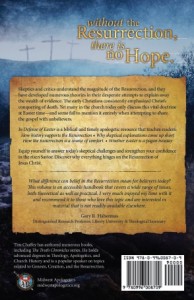
My new book on the Resurrection of Jesus includes a chapter about the disturbing trend of neglecting the Resurrection when sharing the gospel.
Before anyone attacks me as a heretic for the title of this article I need to state that the gospel is full of hope. The gospel “is the power of God to salvation for everyone who believes, for the Jew first and also for the Greek” (Romans 1:16). Since people are saved by God through the gospel message, how could I possibly put the words hopeless and gospel together?
Listen closely the next time you hear someone explain the gospel. There’s a strong possibility that what you hear will go something like this:
We have all sinned against a holy God. As a result of our rebellion, we deserve His wrath and judgment. But the good news is that God sent His Son, Jesus Christ, to bear our sins upon Himself on the Cross. His sacrificial death satisfied God’s wrath against sin, and all who will turn from their sins and place their faith in Jesus alone will be saved.
I cannot tell you how many times I have heard pastors and other Christian leaders say something just like this while presenting the gospel. The problem is, although the message above is true, it is incomplete. There is a gaping hole in this message.
The Gospel in a Nutshell?
Before I explain what that gaping hole is, look at the following quote from popular pastor Tim Keller and see if you can figure out what is missing.
Christianity is a way that says if you come to Jesus Christ, even if you aren’t good and decent, even if you aren’t wonderful, and even if you don’t have a good record, anybody through Christ can find God. Somebody says, ‘How can that be?’ Let me just put the gospel in a nutshell: because Jesus Christ lived a perfect life and died a perfect death, now God treats you, when you believe in Christ, as if you have done everything Jesus has done and you have suffered everything Jesus has suffered. God treats believing sinners as if they had done everything Jesus has done and suffered everything Jesus has suffered.
That means when you believe in Christ you’re adopted not on the basis of your record, but on his record. You’re adopted into the family and treated as if you’d accomplished everything he’s accomplished. That’s the gospel. Somebody says, ‘It’s too easy.’ I don’t know how many times people have said, ‘That’s just too easy. You mean you just receive it?’ Yeah, but you have to receive it through repentance, and that’s what’s not easy at all. The only way to get to that peace is through paying the pain of repentance. In other words, all you need is nothing, but most people don’t have that.1
Ironically, this so-called “gospel in a nutshell” is not an accurate representation of the gospel preached in the New Testament, but it does match what many modern Christians claim is the gospel. Have you figured out what’s missing yet?
The Actual Gospel
In 1 Corinthians 15, Paul clearly spelled out the gospel message he preached. Compare his words with the examples cited above.
Moreover, brethren, I declare to you the gospel which I preached to you, which also you received and in which you stand, by which also you are saved, if you hold fast that word which I preached to you—unless you believed in vain.
For I delivered to you first of all that which I also received: that Christ died for our sins according to the Scriptures, and that He was buried, and that He rose again the third day according to the Scriptures… (1 Corinthians 15:1–4, NKJV)
Paul stated that the gospel message he preached, the gospel message that saves, is that Jesus “died for our sins according to the Scriptures, and that He was buried, and that He rose again the third day according to the Scriptures.”
Now do you see what’s missing from so many gospel presentations? The Resurrection! The next few times you hear the gospel explained, chances are that the Resurrection will be neglected. How can this possibly be? How can Christians who clearly do believe Jesus conquered the grave forget to mention this key component of the Gospel?
I recently had an opportunity to address this issue before my colleagues. I wasn’t aware the talk was being video recorded, but I’m glad it was so that people can check out this important message. In the talk I cited several examples of the Resurrection being neglected in gospel presentations, including the Keller quote above. Then I did a brief survey of Acts and Romans to demonstrate the centrality of the Resurrection to apostolic teaching. Every time the apostles preached in the book of Acts, the Resurrection was central to their message—every time! Watch the video for yourself to see how important the Resurrection was to the early church.
After seeing this presentation, several people admitted to me that they have often failed to mention the Resurrection when sharing the gospel. One woman, convicted by what I said, told me that she has had the opportunity to share the gospel with young people nearly every week for the past several years and then she said, “I never bring Jesus out of the grave.”
How Can We Forget the Resurrection?
In my new book, In Defense of Easter: Answering Critical Challenges to the Resurrection of Jesus, I elaborate on this subject in much more detail. Here is a brief list of some reasons why I believe some Christians overlook the Resurrection when attempting to share the gospel.
- Some people focus so much attention on various aspects of what Christ accomplished at the Cross that they forget to mention what happened three days later.
- Some people get caught up in debating theological and historical points about the Cross (e.g., Did He die for all or only the elect? Was He nailed through the hands or the wrists?).
- Some people use the Cross and the beatings Christ endured to pull at a person’s heartstrings, hoping that they will respond out of emotion. (I call this the Passion syndrome, based on Mel Gibson’s movie which showed 2 hours of the horrific torture Christ endured for us, but ended with less than 90 seconds on the Resurrection.)
- For many Christians, when they mention the Cross, the Resurrection is a given. They consider the two to be a package deal. But we need to remember that the unbeliever may not think this way, so we must mention the Resurrection.
- I believe some Christians simply shy away from discussing the miraculous. It’s easy to say that Jesus died on the Cross, since many people have died on crosses, but it’s quite another thing to claim that He rose from the dead.
- The more I pay attention to this, the more I believe that some Christians really don’t understand that the Resurrection is part of the gospel message.
I am sure there are other reasons that could be listed. Praise God that so many Christians are still willing to talk about the Cross, but we dare not forget to mention that He conquered death.
Hope-less or Hope-full
The Apostle Peter wrote the following words in the introduction of his first epistle.
Blessed be the God and Father of our Lord Jesus Christ, who according to His abundant mercy has begotten us again to a living hope through the resurrection of Jesus Christ from the dead… (1 Peter 1:3)
Our “living hope” is due to the fact that Jesus rose from the dead. Because He rose, we know that death is not the end. Death has been defeated, or as Paul put it, “Death is swallowed up in victory. O Death, where is your sting? O Hades, where is your victory?” (1 Corinthians 15:54–55).
Because Jesus had victory over the grave He will raise us from the dead. We will see our believing loved ones again who have already passed on. The Resurrection was proof to all men that the message of the apostles was true (Acts 17:31). It was the one sign Jesus said He would give to an unbelieving and adulterous generation (Matthew 12:39–40). Paul even stated that Jesus was “raised for our justification” (Romans 4:25, ESV).
The Resurrection is more than just the icing on the gospel cake—it is an integral part of the cake. It was never an afterthought for the apostles. As far as we know, it was always central to their evangelistic efforts. I often say that the Crucifixion and Resurrection are like two sides of the same coin—you can’t have one without the other. Without the Resurrection, the Crucifixion becomes meaningless for us because Jesus would have been a fraud and a liar who could not die for our sins. And of course without the Crucifixion, there would be no payment for sins and no need for the Resurrection. Both are vital elements of the gospel.
Conclusion
I am not accusing any of these sincere believers of preaching a false gospel, but they are preaching an incomplete message. Do I think God will still use their words to turn people to Himself? Of course I do. God frequently uses our shortcomings, and I believe the Holy Spirit can still bring conviction even when someone forgets to mention the Resurrection.
Perhaps I could summarize what I am trying to say like this. The fact that Jesus died for our sins is good news indeed, but it didn’t become THE good news until He rose from the dead. We are called to preach the good news that “Christ died for our sins according to the Scriptures, and that we was buried, and that He rose again the third day according to the Scriptures” (1 Corinthians 15:3–4). If we neglect to discuss the Resurrection, then we present a message that is lacking the hope mentioned in Scripture.
Quote taken from Tim Keller, “The Gospel in a Nutshell” http://kellerquotes.com/the-gospel-in-a-nutshell/ ↩

